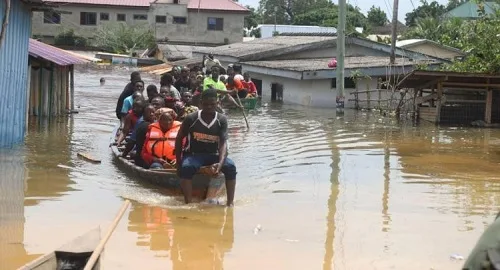
The Asuogyaman District of the Eastern Region has witnessed a dramatic increase in cases of Schistosomiasis, commonly known as Bilharzia.
The Ghana Health Service (GHS) is expressing deep concern over the rapid surge.
Data from the District Health Directorate paints a worrying picture.
In 2021, the district reported 21 cases of Bilharzia.
This figure increased slightly to 25 cases in 2022.
However, the most recent statistics reveal an alarming spike, with 75 cases recorded as of the last week, representing an astounding 200% increase in cases.
The affected persons are being treated by the GHS.
While Bilharzia has traditionally been endemic in communities along the Volta River, the recent upsurge has sparked concerns that it might be related to the flooding triggered by the Akosombo Dam Spillage.
The communities heavily rely on the Volta River for their daily activities, including drinking, swimming, and bathing, however, currently grappling with severe pollution issues, which have significantly deteriorated the quality of the river’s water.
This intensifying pollution has become an immediate cause for alarm, as it directly affects the health and well-being of the communities residing along the riverbanks.
Schistosomiasis is a disease caused by parasitic flatworms that can enter the skin when individuals come into contact with contaminated bodies of water.
The disease is notably associated with bladder cancer, and while there is no vaccine for it, there is a drug available for treatment.
Transmission occurs when larval forms of the parasite, released by freshwater snails, penetrate the skin during contact with infested water.
Further transmission can occur when people suffering from schistosomiasis contaminate freshwater sources with feces or urine containing parasite eggs, which then hatch in the water.
Significant concerns have been raised following the spillage of the Akosombo Hydro Dam which has caused severe floods in numerous communities polluting Volta River, potentially exacerbating the spread of the disease due to the increased pollution.
Member of Parliament for Asuogyaman, Thomas Ampem Nyarko, over the weekend while distributing relief items including rice,cooking oil, bottled water with support of the national chairman of NDC Johnson Asiedu Nketia ,advised residents in flood-affected communities to refrain from drinking raw water from the river or swimming in it to protect themselves from infestation with the Schistosoma parasite and other waterborne infections.
Thomas Ampem Nyarko emphasized the importance of heeding this advice, citing the prior discovery of the Schistosoma parasite in the lake by the District Health Directorate.
He stressed the need to boil water fetched from the lake thoroughly and allow it to cool down and filter it before use stating that the river has been seriously polluted due to the flooding, as it carried rubbish and human excreta, making the water unhealthy for consumption.
He assured residents of his commitment to quickly mechanize a borehole in the Kokonte Kpedzi Community to provide safe drinking water.
It’s important to note that according to estimates from the World Health Organization, a significant number of people required preventive treatment for schistosomiasis in 2021, with a focus on periodic, large-scale population treatment with praziquantel.
This, along with improvements in potable water, sanitation, and snail control, is crucial in reducing transmission.
Source: Ghana/Starrfm.com.gh/103.5FM/Kojo Ansah




